Identity and Service fulfilled in Christ
2019. október 07., hétfőAccording to her, people can only reach their goals through the Gospel, she can incorporate both her faith and her professional experience into her current work with Roma communities. Anita Tóth has been serving as the National Roma Mission Coordinator since September 2018. In this interview, we discussed the importance of family and traditions, the work of the Holy Spirit, and her way leading to the Synod Office.
You have been the coordinator for over a year now, and although you have organized several big events for the Roma Mission, we know little about where you come from – please tell me a little bit about yourself.
My mother was born into a mixed family; her mother was Oláh Gypsy and her father was a musician. However, I know from stories that my paternal great-grandmother spoke Romani too. My paternal great-grandfather died in Russian captivity, he and his two sons, my grandfather and his brother were captured together, but only my grandfather returned. It wasn’t easy to put all of this together because my family only had a vague idea of when and where they were taken. But with the approximative dates and locations, I was able to complete the puzzle: they were taken captive by the Russians. My grandfather came home on foot, his leg was injured because of the long road, the freezing cold, and the beatings suffered in the camp, so he limped all his life. But at least he lived.
I come from Szabolcs County, my father is from Nagyecsed and my mother is from Tyukod – she raised me, we lived in the town until I was three years old, then we came to Budapest. I’ve been living here since, but during my childhood, I spent most of my summer with my mother’s family in the Roma settlement. My time there is a beautiful memory of mine because I have a lot of cousins. Half of my mother’s siblings live in Budapest too, and the other half stayed in the town – the two balanced each other out. I considered it a blessing that I could spend my childhood with my whole family, sometimes in Budapest, sometimes “at home,” as my mother calls it to this day.
In Tyukod, our family lived in the same street, in five or six houses, and it was normal that every door was open to everyone. We had breakfast at one place, then we had lunch wherever we were at noon, and that was also true for dinner.
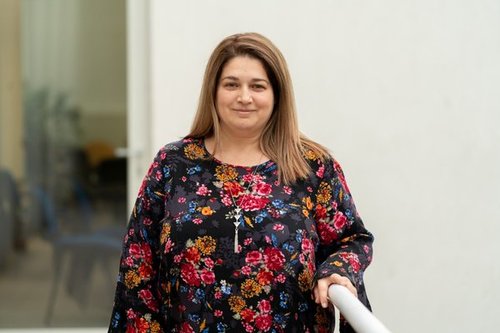
Did you stay in touch with your father’s family?
Not initially, I first met them when I was fourteen. And despite it wasn’t an integral part of my life, the heritage of my father is an important part of my identity: I consider myself more Oláh than Romongró, the latter is Hungarian Roma.
How did you gain a foothold in Budapest?
It was just me and my mother, who chose a really strict parental strategy that I’ve been grateful for ever since. The relatives living in the capital always took her side when it was about my future, and they pointed out the importance of education and obedience – and for good reason. Imagine a 21-year old woman, who hasn’t completed primary education, alone with her child in the middle of the Roma settlement. How does she get her daughter to a great workplace such as the Synod Office of the Reformed Church in Hungary? What is that, if not a miracle of the Lord?
There’s a story in my family, and I believe it is true: my mother only had two changes of clothes, and she could only buy a train ticket after she sold one of them. My possessions were a baby bottle and some clothes in a plastic bag. In one hand, she had the plastic bag and the bottle, and in the other hand, she carried her three-year old child. With that, she took off to Budapest.
Why do you think your family considered your education so important?
There wasn’t any learned pedagogy or methodology behind this, like today when we try to educate ourselves all the time about how to be a good parent. What they did came from their instincts and it was guided by their love. I saw that their lives were an incredible struggle, but I never noticed this struggle with my mother. For example, I never saw her stressed or impatient with me, so I only have good memories of my childhood.
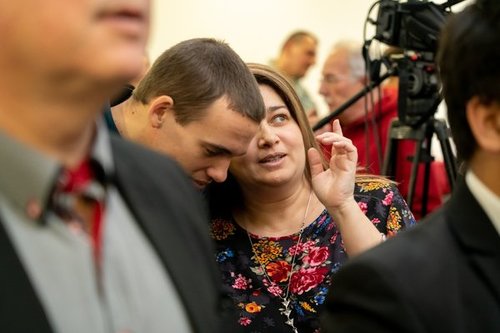
Were you in contact with other Roma communities outside of your family?
I only realized when I was 20–25 years old that I know nothing about the Roma living in Budapest.
How come?
It was natural that, at home and in Tyukod, we were amongst Roma people, but besides that, my mother didn’t let me go anywhere. I only went from home to school, then back home, and in school I only got to know a few Roma kids – I’m not exaggerating when I say that I grew up in Gadje (non-Roma) surroundings. My mom worked in a kindergarten with academics, and I studied in a non-segregated, reputable institution, from fifth grade in a class specialized in English.
What was the first step for you in defining your own identity?
I consider the years I spent in primary school important: this is when I realized that there are non-Roma people, and not everyone sees the Roma in the same way. I am really grateful to God, I wasn’t attacked many times because of this. Now that I think about it, it only happened once.
Unfortunately, only a few people could say the same thing today – how were you “protected” from this?
I thought about this a lot in the past years. I think that God protected me because most of the time, I didn’t even realize that I had been attacked. But if I found out later that a remark or a comment was actually about my descent, then I always remembered that this is not about me. If someone thinks bad about me, mocks my ancestry, and/or has a stereotypical mindset, this is not my problem, but rather that person’s. The person should work on their soul, not me.
However, it really hurts when someone else is being abused. When the person attacked cannot protect themself. When children, the elderly, those living with disabilities, or who are unable to defend their interests - the disadvantaged - get attacked, I feel sadness, anger and an immediate will to act.
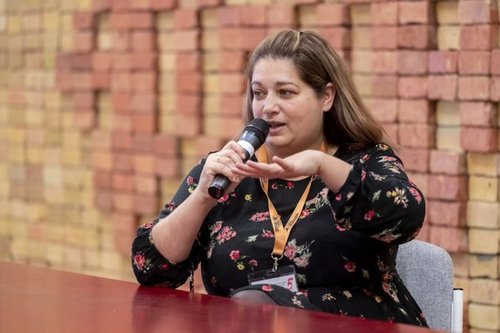
Did traditions have a great impact on the way of life in your family?
My mother didn’t make a big deal about being Roma. Especially because of the Gadje environment, as I mentioned before: my aunts worked in the doctor’s office and in a factory, my uncles worked in construction, and my mother in a kindergarten. In everyday life it didn’t matter, but when we were together, we were a typical Roma family.
For those who are not familiar, what is a typical Roma family like?
We were together every weekend – at a normal Saturday lunch, there was ten of us around the table. This was a big change for me because it used to be only two of us, me and my mother. My mother had eleven siblings, and when my grandmother died, three of them were still very young. My mother was no longer married and my grandma left the little ones to her, so they came to Budapest and lived with us.
What was your relationship like with them?
It was as if we were siblings – a very strong emotional bond developed between us.
You mentioned that you only got to know your father when you were already a teenager. How did your relationship turn out with him?
I really liked how they experienced being Roma: not flamboyantly, but with dignity and pride. I integrated a lot of things into my identity unquestioned, except early in my marriage and the expectations they had for women, which were unacceptable to me. When I was fourteen, my father appeared out of nowhere, and told me who I was supposed to marry. I didn’t understand what he wanted, because I knew nothing back then about the relationship between men and women. Nothing came of it, of course, and the part of me that is fighting for equal rights cares even more about the situation of Roma women, maybe because of this experience too.
What did you keep from your father’s heritage?
Honestly, I selected the things from this culture which were adaptable to my world view and faith. Today, as a devout Christian, I know what the Gospel ordains for us, which is also a great opportunity to examine those dynamics, practices which are part of our lives, and that includes our brought or acquired culture.
To mention a concrete example: when I was in my twenties, I started to re-learn the Romani language. I started to work with the Roma – my first workplace was at Radio C, which stopped broadcasting in 2011. They were looking for an intern reporter for the education and social program, and I started to work almost immediately – I had just submitted my application to university to major in communication. From this point, my life was practically “determined,” and my jobs always connected to the Roma community in one way or another. Whether this was my choice, or the Lord led me on this road, I don’t know, but maybe it doesn’t even matter.
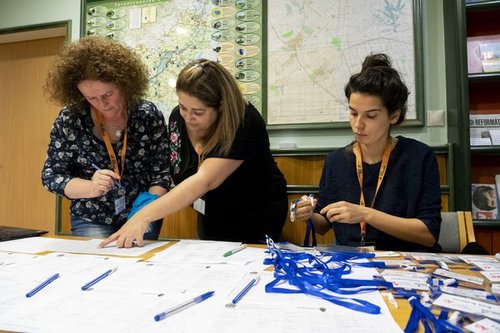
How did you define your goals?
I was twelve when I heard a sociologist on TV talking about the connection between the Roma community and poverty. I remember that it was good for my soul, and she talked so eloquently. I thought to myself that if this is what sociologists do, then I want to be a sociologist too! Things didn’t happen that way, but I still engage with this topic because it is really close to my heart. What didn’t change is that I always have to be at a place that is compatible with my values: I got to know Roma advocacy, and simultaneously, started to work in community development.
Did you have any other motivation apart from that TV show?
In school, I always befriended those who were being attacked because of something. People who was being bullied because they didn’t have good grades, or came from a disadvantaged family background, or because they had lame hair or clothes. I protected people like this, I made a point by being friends with them, I spent the breaks with them. Because I was a good student and kind of popular, this was my “weapon” back then – to raise attention to injustice and to disavow those processes which led to the exclusion of someone. Of course, I wasn’t doing this consciously, I simply did what felt right. This has remained a part of me to this day. We have to notice those, who in some way or another get hurt, and we have to work towards a constant and reliable system, which turns towards them with enormous love and righteousness. It is a wonderful feeling that I can be a little cog in this system.
What kinds of jobs prepared you for your position as the national coordinator of the RCH Roma Mission?
I worked for both the government and non-governmental organizations in positions where I was responsible for the integration, desegregation and educational success of Roma children. I also worked as an equal opportunity expert, where it was inevitable that I got to know the Roma communities. Sometimes we stayed at one place for years, we helped them to start projects and so on. This was life: breathing the same air as Roma people, being together with them and helping them. The people, the faces, the situations often remind me of my own family, and this is such a great feeling. It is the greatest blessing in life, when your job is also your calling – I feel this was given to me by divine providence.
What part did faith play in the last twenty years in the formation of your professional insight?
I was ten years old when the Iron Curtain fell, so one could take religious education (RE) in school. One less popular classmate of ours went to them and I will never forget that while we were walking in the schoolyard during the break, he taught me the Lord's Prayer. He told me that during RE class, we pray, sing, and read the Bible, and I liked it so much that I decided to join. I took Catholic classes and took the First Communion later, and until I was almost thirty years old, wherever I lived, I found a local community where I could spend Sundays in church.
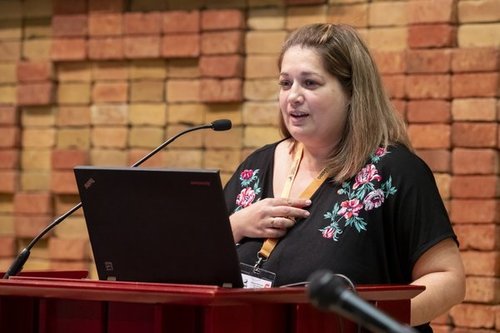
Did you receive a Christian upbringing?
Only my grandma was in church every Sunday, she was the only Roma woman, she sat there in traditional Roma attire with the other Hungarian women from the town. Baptism and confirmation are part of the life of my family. It is obvious that we have faith, my older family members fear God, they love and respect the Lord, but not all of them are members of a congregation. The younger members of my family are all religious, Christian people. I converted in the same congregation as my husband, faith and turning to God are the foundation of our lives. We are trying to raise our children with this mentality: praying together and reading the Bible are part of our everyday lives.
What moved you to work in the Reformed Church?
It was important to me to find a workplace where I can be proud of my faith. The Holy Spirit told me through my prayers, that I always had my heart in my job, but it matters in what context and by which means I try to reach my goals. There is only one answer to this: the Gospel. I bumped into to the advertisement for the national coordinator position accidentally, and God decided that he wanted to see me here.
Did you step into the building of the Synod Office as a complete stranger?
No, nine years ago I was a translator for a research project which was examining the Roma missions of the denominations present in Hungary. What connected me here was that I interviewed the coordinator back then. I found it really engaging, the vision I felt from the church, this has increased my commitment to the job as well.
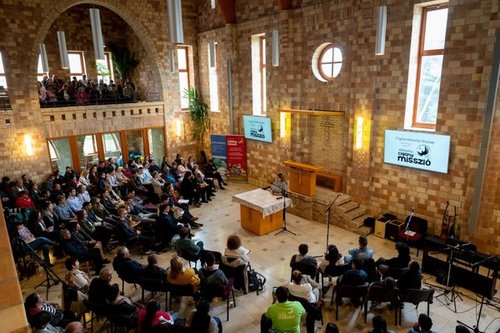
What was the most important finding for you in that earlier research project?
It was evident that in those Roma communities, where a Roma mission or any other service like that was present, huge changes took place in the lives of people. Both working with NGOs or in public administration, I saw that a project of this kind can be really effective in these communities – that big results can be seen. But in these communities, change happens through the Word of God, through the conversion of people, that is where the biggest achievements happen. That’s why I think and believe that there is only one way to make change happen, to get results, and that is through spreading the Gospel, living together with our Roma brothers and sisters, and serving them in every municipality and community. That is the task of the churches.
What kind of experiences did you gain during your work as the national coordinator?
Last October I had to organize three large events – a theological study trip, a reconciliation seminar, and a Roma Mission conference. At first, I didn’t even know where to begin. But based on the feedback we got, I feel that we made a success out of everything. It wasn’t easy, but it wasn’t hard either: I worked in an eight-member team, where I was never alone. We already began to organize events in January, which has not been common before. I always feel that our service is needed in the communities, and this is really inspiring.
What kind of events are at the center this year?
We concluded the Protestant Gathering and the Roma Mission Day of Prayer, and in May, we held a conference where we presented the work that our church does among Roma people. We were also be present on the weekend at the Hungarian Reformed Unity Day in Debrecen, and at the Starpoint Reformed Youth Festival in July, and in the Bárka Children Camp, where we organized sessions for the adult companions during the summer.
At the beginning of August, we organized, for the first time, a Porajmos (Roma Holocaust) commemoration and of course, we will organize our traditional three-day conference in Berekfürdő in October. I’m confident that God will bless our plans.
Interview by Attila Dezső
Translated by Zita Kuzsel
Edited by Priscilla Yang, Avery Gill
Photos by Vargosz
Contact us
Click here if you are interested in twinning.
Reformed Church in Hungary
Address: H-1146 Budapest, Abonyi utca 21.
PO Box: 1140 Budapest 70, Pf. 5
Email: oikumene@reformatus.hu
English, German and Korean language services in Budapest
Links
Recommended articles
-
Pastoral Letter in the Light of the Pandemic
Bishop Dr. István Szabó sent a pastoral letter of encouragement to the ministers serving in RCH’s congregations, expressing his gratitude for the persistence and creativity of the pastors.
-
RCH Joins in Pope's Call for Prayer
RCH published the call on congregations to join the initiative of Pope Francis, supported by ecumenical organisations, to unite in praying the Lord’s Prayer on Wednesday, 25 March, at noon.
-
English Speaking Worship Services Online
Each Sunday at 11 AM (CET) the St. Columba's Church of Scotland in Budapest, the international community of RCH invites you to join the worpship service on its facebook page.
-
Test of Humanity and Companionship
Reformatus.hu asked Dr. György Velkey, Director General of the Bethesda Children’s Hospital of RCH about the challenges of health care workers and ways of prevention against the pandemic.
-
All Church Events Suspended
In light of the coronavirus the Presidium of RCH requested congregations to suspend all church events with immediate effect. Beside restrictions, it calls for prayer, sobriety and responsibility.











